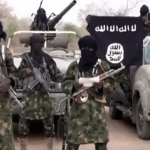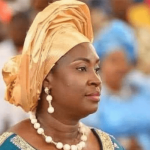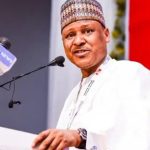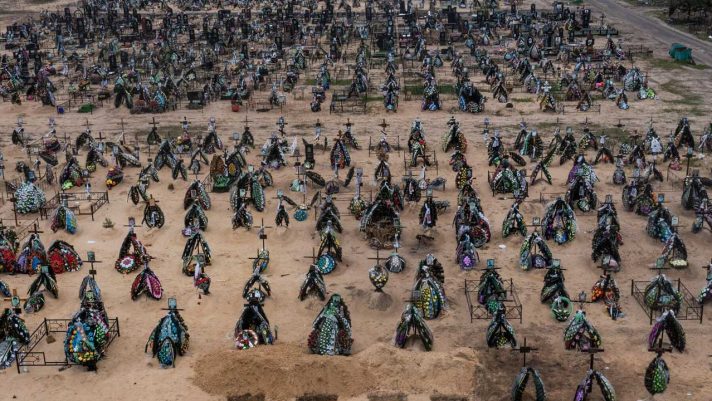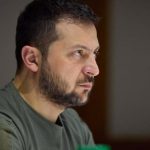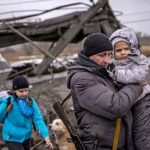By Wole Oyebade and Femi Adekoya
In a year international diplomacy and political actors failed to etch a more humane world, we remember people of the world – the helpless victims of their failure and needless anguish of global proportion.
Annus horribilis fittingly sums up 2022. It was a year of World War that wasn’t. Yet, the entire globe felt the scorching heat of a conflagration that is typical of a bygone century. Indeed, it was one of those horrible years when politics of a globalised world made no real sense!
Never in the history of international relations has a seemingly ordinary cross-border threat of aggression between two neighbours gained international currency and its ripple effects shattering lives and decent living in cities beyond.
Truly, when Russian military forces fired missiles into Ukrainian cities on February 24, not many outside the diplomatic space were bothered. After all, it was a routine ‘family affair’ between two Soviet cousins.
But when warships got in the way of wheat vessels in the Black Sea, sending supply shocks to cost of bread in homes around the world, and Russia turned off gas supply to European homes and industries, the entire globe knew of the invasion and the collateral pangs of war too. The reality in the following weeks was a world falling apart on multiple fronts!
One fortuitous crisis is bad enough for any government. To have two of a kind – in food and fuel crises – on the same day, is perplexing. Global inflation has since got a massive push as central banks got hit badly. While advanced economies are rolling out subsidies to stave off shocks, vulnerable counterparts are getting weaker and its beleaguered masses are turning the heat on State administrators. Everyone is taking blows for the disaster they undermined!
Unfortunately, the add-on effect has been more on everyday people. The hypocritical State-actors that conspired to put the world in avoidable peril are not heroes but villains. The ordinary people and victims that have born it all, stoically enduring pains and personal tragedies of conflict that is not of their making, are the real heroes.
They include those average citizens that fought almost bare hands and died in defence of their towns in Ukraine. We remember thousands of poor citizens that braved daily resistance against Russian forces, enduring power and water outage for months! Scores that died on March 16 when a Russian rocket target a Mariupol theatre where women, children and elderly were taking shelter! Several millions of Ukrainians that are just settling into bouts of war depression in haunted cities of Mykolaiv, Kherson, Mariupol, Donetsk, Luhansk, Kharkiv and Chernobyl in an economy that has shrunk by a third.
Victims too are millions of vulnerable citizens that have become displaced and refugees far away from home. What of thousands of young ones that are forcefully conscripted into backup Russian forces in Moscow – facing a grim and uncertain future? Thousands of African students did abandon studies and fled from Russian shelling. Not only were they denied seats on evacuation trains, they were refused refugee status at Polish and Hungarian borders! They were left in the cold just because they are blacks! They are victims too. They managed to return home to find local economies and general wellbeing in worse shape, with food and energy cost unbearable for many.
There are more victims in over 90 countries where soaring cost of fuel and food helped spark civil unrests in 2022. Among them are casualties of avoidable wars in Tigray, Libya, Syria, Afghanistan, Yemen, Myanmar, Middle East, and in the Sahel region where Boko Haram and Islamic State of West Africa Province (ISWAP) are daily killing and kidnapping innocent citizens. The discomfort is the same – though of varying degrees – in Accra, Aberdeen, Addis Ababa, Bamako, Borno, Casablanca, Dakar, Delhi, Islamabad, Jakarta, Johannesburg, Jos, Kabul, Lagos, Laos, Lilongwe, London, Milan, Moldova, Seoul, and so on. After COVID-19 pandemic, the Russian invasion of Ukraine has become the new alibi for all failures of governance in 2022. Many victims in Nigeria and Africa also got to know the real source of fuel and wheat they consume – as against government propaganda. Not for denial is a continent on the edge, with more people poorer and democracies threatened.
To all these people of the world that are simultaneously vexed and made hopeless by the warp international system; in recognition of their anguish, existential dreads, yet the courage to fight on despite common suffering, the fading dream of a world without wars, and continuous cravings for responsible leadership across the board, we dedicate The Guardian Person of the Year.
Russia-Ukrainian war: Not just an invasion
Since the Cold War ended in 1991, following the collapse of the Soviet Union, the arc of history has bent in one direction. New York Times columnist, Thomas Friedman, dubbed it the “age of globalisation”. The era underpins an internet-networked global village that is laced by the ease of economic relations among States, sharing of prosperity through free-flow of goods, money, information technology, cultural exchanges and institutional leadership of the United Nations (UN).
The assumption is that the diplomacy of shared prosperity and mutual economic interdependence of nations will cage aggressive behaviour typical of 20th Century State-actors, and foreclose prospects of another war of all against all. To complement collective progress and keep a tab on efforts, global developmental agenda were deployed. The latest has been the Sustainable Development Goals (SDGs) guideline, to enhance an equitable distribution of wealth and humane world for all by 2030.
But the theory of world-without-wars is largely utopian. Its proponents and other idealists in the international system did have a fairytale until they were again brought to reality in early 2022. Actually, instead of a more uniform world as promised by globalisation, something more insidious has been created by the international system of power geopolitics. It turns out to be a 21st Century dichotomy between the Western democracies and the so-called autocracies of the East – which has Russia, China, North Korea, Iran and others the Western media often demonised as “rogues”.
The West sees itself as the saintly harbinger of rule of law, human rights, justice and freedom, with the mission to outdo “devious” influence and growth of authoritarian regimes through enforcement of liberal democracy worldwide.
But neither China nor Russia would concede to the omnidirectional oppositionalism of the West. In fact, Vladimir Putin’s Russia has never disguised its fantasy of returning to the old Soviet prominence and a pushback on the eastward expansion of western dominance.
As the Honorary chairman of Russia’s Council on Foreign and Defense Policy, Prof. Sergey Karaganov, puts it: “The conflict in Ukraine, like many events of the last decade, is not only about shattering the old world (of Western hegemony), it is also about creating a new, freer, fairer, more politically and culturally pluralistic and multi-coloured world. And, of course, a fair share of the world’s wealth.”
Suffice to note that Russia and Ukraine were members of the defunct Soviet Union and very little to choose between the two neigbours. Conflicts in eastern Ukraine began in 2014 after a pro-Russian president was toppled in Ukraine’s Maidan Revolution and Russia annexed Crimea, with Russian-backed separatist forces fighting Ukraine’s armed forces. The United Nations estimated that about 14,000 people were killed between 2014 and the end of 2021. Among them are 3,106 civilians.
President Volodymyr Zelensky could not feel at ease having to keep looking over his shoulders for Russian aggressions in Ukraine. Just like other former-Soviet members, an insecured Ukraine started pushing to become a member of the North Atlantic Treaty Organisation (NATO) – an intergovernmental military alliance of 30 countries led by Russian arch-rival, the United States. Ukraine joining NATO ab initio violates an earlier agreement NATO had with Russia for the sake of peace in the region.
Again, Putin is challenging NATO’s rights to possess and station military hardware on the “Russian doorsteps” (through Ukrainian membership of NATO). The scenario is akin to the U.S. threatened invasion of Cuba exactly six decades ago, on sighting Soviet nuclear missiles in Cuba, which is next-door to America. Remarkably, the nukes were removed to pacify the U.S., while America also secretly removed hers from Turkey to bring the crisis to an end within 13 days. Now, the rehash of that plot has lasted more than 300 days and the globalised world is the worst for the power-play.
Food and energy weapons of war
The coast is not yet clear on the number of casualties beneath rubble in Ukraine. Most conspicuous, however, has been the biting economic shocks on the entire globe.
First, there is something sinister about the timing of the invasion. It came in a New Year and in a sick world just recovering from a rapidly exhausting pandemic. Humiliating exit of America from Afghanistan, and divided West became additional incentives for Kremlin to “quickly” over-run Kyiv through “a special military operation” and “de-Nazify” Ukraine led by Jewish President Zelensky.
So when the first rockets were fired into civilian populations, despite months of warnings by the United States, European economies were too jaded to muster military actions against Russia. That partly explains the choice of economic sanctions against Russia and corresponding supplies of arms to Kyiv to fight “de-Russification” of Ukraine and resistance against imperial onslaught “against the West”. In retaliation, Russia simply turns off its gas supplies to Europe and the consequences have been dire.
Notably, Russia is the world’s second largest oil exporter after Saudi Arabia and the world’s biggest exporter of natural gas, wheat, nitrogen fertiliser and palladium. Russia also accounts for about 50 per cent of natural gas used in Europe. Since Russia cut 85 per cent supply as a pushback for Western sanctions, the price of energy has spiked in Europe and beyond. Too many industries that had been dependent on Russian gas are shifting to “another autocrat”, China, for survival. Unrelenting in energy weaponry, the Kremlin on November 22 threatened to throttle the last operational pipeline to countries in Southern and Eastern Europe.
Right now, there is high apprehension that this winter will bite harder amid the energy crisis. Goldman Sachs, a bank, projected that gas prices in next summer will be around £235 per mwh, far higher than they were mid-2022. The pre-pandemic rate was £20 per mwh.
The Economist’s modeling suggests that in a normal winter, a 10 per cent rise in real energy prices is associated with 0.6 per cent increase in deaths. The energy crunch this year could cause over 100,000 extra deaths of elderly people across Europe. That is already more lives than Russian artillery, rockets, missiles and drones directly killed in Ukraine in the last 10 months.
As of October, the United Nations High Commissioner for Human Rights (OHCHR) estimated that 6,114 civilians were reported killed and 9,132 injured, though the actual numbers are much higher. The crisis has produced more than 7.8 million refugees (out of 41 million Ukraine population) across Europe, with the biggest numbers in Poland, Russia and Germany.
Ukraine’s inability to export essential wheat, maize, and barley to the world market has plunged many countries on the brink of starvation and surging food prices. In a year the world population peaked at eight billion people, the United Nations Secretary-General’s Global Crisis Response Group (GCRG) on food, energy and finance systems said the war in Ukraine threatens to unleash an “unprecedented wave” of global hunger and destitution.
Already, an estimated 1.6 billion people in 94 countries are exposed to at least one dimension of the crisis, and about 1.2 billion of them live in “perfect-storm” countries, which are severely vulnerable to all three dimensions – food, energy and finance – of the cost-of-living crisis.
Countries in sub-Saharan Africa, for example, remain significantly vulnerable with one out of every two Africans exposed to all three dimensions of the crisis. The United States Institute of Peace has it that there is an impending food scarcity in Africa, based on the consideration that in 2020 alone, Africa imported $4 billion and $2.9 billion worth of agricultural products respectively from Russia and Ukraine.
Economic squeeze, exacerbated by the misfortunes of the war, is telling on many Nigerians. The reality of poor local production capacity has become glaring in the rising food prices. Though Nigeria has its own prevailing challenges, especially one bordering on insecurity, the inability of farmers to exploit the full potential of their farms and the oil sector to take advantage of rising prices like other producers have plunged the country into dire straits with many lenders avoiding the country.
While oil and gas exports account for 90 per cent of Nigeria’s foreign exchange earnings, falling oil output and demographic growth mean that production is spread increasingly thinly across the population. At the same time, the country spends a worrying proportion of its hard currency on fuel imports, amid subsidies that continue to overwhelm earnings from the paltry crude being produced. To make matters worse, the inflation rate is rising, as well as a stretch in the over N41.6 trillion debt servicing, which has exceeded revenue generation. The Russia-Ukraine war has also affected the importation of raw materials for fertilizer and other agricultural commodities, which may be threatening the food security of Nigeria and other countries.
According to a recent World Bank report, Nigeria faces “an elevated risk of recession over the next two years, reflecting the greater potential for the geopolitical tumult, stubbornly high inflation that reduces households’ real disposable income, and central banks’ intense focus on fighting inflation first, which raises the risk of financial accidents on top of the sharp tightening of financial conditions already seen.”
Though Nigeria’s situation seems peculiar, the war has no doubt heightened local tension. With a weakened currency and disposable income, Nigeria has equally witnessed a sharp rise in immigration among youths and several professionals, especially those in the health sector, as inflation continues to weaken the remaining middle class. Some Nigerians have even offered to fight in the war for an income as unemployment remains high.
In 2023, Europe will not be the only one struggling to survive the winter, Nigeria will equally catch the cold considering that refined fuel (Petrol and diesel) will largely remain within the EU zone to ensure accessibility and reliability of energy sources. This means, Nigeria and other African countries will get limited supply of refined fuel, thus leading to higher prices and scarcity. The manufacturing sector is on bended knees as the world remains an interconnected global value chain. With the absence of critical inputs and machinery, productivity has remained very low.
UN Secretary-General, António Guterres remarked: “For those on the ground (in Ukraine), every day brings new bloodshed and suffering. And for people around the world, the war, together with the other crises, is threatening to unleash an unprecedented wave of hunger and destitution, leaving social and economic chaos in its wake. Vulnerable people and vulnerable countries are already being hit hard, but make no mistake: no country or community will be left untouched by this cost-of-living crisis,” he said.
The domino effect is telling on vulnerable economies more, forcing most central banks to make painful adjustments on interest rates as inflation accelerates. The International Monetary Fund (IMF) and World Bank are receiving distress calls from other parts of the world, including low and even middle-income countries whose debt repayments are surging as global interest rates keep rising. According to the U.N., 54 of them already have “severe debt problems.” The economic pain could get worse as the dollar appreciates, due to the Fed’s interest rate hikes, and pushes up the price of imported food.
In Europe, Ukraine’s economy is tanking and set to contract by 45 per cent in 2022. The saving grace for advanced economies for now, though not sustainable, is the government giving generous handouts to suck in the baleful consequences of energy crunch. Since September 2021, €573 billion of public money has been allocated to keeping energy prices affordable in Europe, according to Bruegel, a think-tank. Germany alone accounts for €264 billion, while Sweden has spent less than €2 billion.
Already, massive spending on energy subsidies is creating big fiscal problems and new frictions. To manage the squeeze, President Joe Biden’s Inflation Reduction Act imbibed a roll-out plan of $400 billion in handouts for energy, manufacturing and transport and includes make-in-America provisions – mimicking the much-vilified industrial policies of China.
That the two pillars of the world economy are now pushing for economic nationalism and protectionism could only imperil Europe to the risk of mass de-industrialisation. Though the war in Ukraine has lately reunited the U.S. and Europe after the Trump ruptures, unfavorable economic adaptation policies may split them again – and Russia and China will be happier for it .
A more dangerous nuclear implosion looms
Without deterrence, a thick cloud of existential calamity hangs over this “game” of nuclear superpowers. On one hand, the United States and European Union are shipping million-dollar worth of military equipment into Ukraine to compound the misfortunes of the Russian forces. Putin too has said he would deploy “all weapon systems available” to defend the “territorial integrity” of Russia – including all the Ukrainian lands he has annexed through referendum carried out at gunpoint!
Pope Francis in his Christmas message ‘to the city and to the world’, last Sunday, lamented the “icy wind of senseless war buffeting humanity”. The Pope said: “The path of peace is blocked by social forces that include attachment to power and money, pride, hypocrisy, falsehood.” He prayed that the Lord will “enlighten the minds of those who have the power to silence the thunder of weapons and put an immediate end to this senseless war!”
In September this year, the Holy Father hinted of Third World War already on going, though in “piecemeal” conflicts around the globe. “Humanity needs to weep,” the Pope said, “and this is the time to weep”. He urged the international community to use all diplomatic instruments to end this “huge tragedy” and “horror” of war.
The pontiff’s eerie message mirrors the woes that have beset the global economy and the seething catastrophe that may be imminent. Here is the logic: should Putin not win on the battlefield, he will be a wounded animal and the most dangerous kind.
The probability of not winning was self-evident in the November withdrawal from Kherson and the newfound zest to blowup power stations across Ukraine. An overall defeat will only motivate the irresponsibility to go nuclear, which may not spare the Baltic States and allies of Ukraine.
Moreover, Russia is not alone; he has the backing of China, North Korea, Syria and Iran. The U.S. last month, accused North Korea of secretly supplying Russia with artillery shells, and reports over the past month detailed how Iran first supplied Russia with Shahed-136 “kamikaze” drones and trained Russian troops in their use.
America and friends (29 NATO allies) are also warming up to fight in Putin’s arena. They have warned of “catastrophic consequences” should Putin detonate nuclear weapons. Russia has alleged the U.S. of supporting secret biological weapons laboratories in Ukraine. Collectively, they heighten the risk that viruses, bacteria and other pathogens could be used as weapons – wiping out all living things in one fell swoop.
It’s time to avert full-fledged world war!
The world urgently needs the right fixes to turn the corner of a full-fledge Third World War. Both Russia and Europe incompetently underestimated the costly war. Russia’s original plan was to invade Kyiv in a matter of days and install a pro-Moscow government. It has lasted 10 months and Forbes Ukraine estimated that Russia has sunk $82 billion into the war. The United States alone has railroaded more than $18.2 billion in security assistance to Ukraine.
Curiously, West’s supplies of advanced weapons to Ukraine are allegedly finding their way into the black market and then into the hands of extremist and criminal groups in the Middle East, Central Africa and Asia. Security experts have also raised the alarm on the West allegedly recruiting Al-Qaeda and ISIS terrorists from Syria, Iraq and Afghanistan as mercenaries to beef up Ukrainian troops in acts of desperation to keep the war going!
But the world could be more tolerable for all without the war or more hypocritical actions of State-actors across the board. Several countries are getting tired of the East-West conflict or having to take sides. In the recent UN vote to reprimand Russia, 35 countries abstained. Many are resenting the West asserting its concerns as a global problem, whereas wars in Yemen, Ethiopia, climate-related flooding in Africa and droughts are just regional! Arrogant West needs to pipe low.
Indian Prime Minister, Narendra Modi, was spot on when he called for a return to the path of ceasefire and diplomacy in Ukraine. By and large, the devastating war needs a political solution, not more confrontations or militarisation of Ukraine. And to turn the tide, first, the United Nation, despite its disarray, should rally diplomats and Good Offices to negotiate armistice. Regrettably, errant Russia must be brought back to the fold, granted a fair hearing and its agreements with NATO kept in line with the general principle of pacta sunt servanda.
Note that Putin has for long lamented the loss of Ukraine and other republics when the Soviet Union broke apart, to cost Russia its place among the superpowers. Compounding his misery has been their alliance with NATO, and the alliance’s eastward expansion. Karaganov asserted that the “global liberal imperialism was built on sand. It contained a World War III landmine that would sooner or later explode.”
Russia in December 2021 presented NATO and the United States with a set of written demands that it said were needed to ensure its security. Foremost among them are a guarantee that Ukraine would never join NATO, that NATO draw down its forces in the Eastern European countries that have already joined, and that the 2015 cease-fire in Ukraine be implemented. It is time world leaders returned to negotiation on these demands for the sake of peace.
Far-reaching truce is to allow Crimea remains a part of Russia, where it originally belonged until Nikita Khrushchev gave it as a gift to Ukraine in 1954. Zelensky should also agree to neutrality of Ukraine in the East-West rivalry.
It is incumbent on the United Nations too to conduct a referendum or possibly have an exchange of population between Russia and Ukraine. Lest we forget, it was part of the Kremlin’s attempt, in the early 1930s, to remake Soviet society. It led to a catastrophic famine known as the Holodomor—“murder by hunger”—that killed at least three million people in Ukraine. Josef Stalin had then ordered mass deployment of Russian farmers to replace the dead in Ukraine. For the sake of peace today, citizens should be empowered to decide their nationality between the two countries.
Lastly, all parties should bear the cost of rebuilding post-war Ukraine.
War lessons for Nigeria, Africa and victims
The battlefield appears far away, but the humanitarian toll is here at home. Soaring costs of food and fuel are revving up tensions in African countries, including Nigeria and South Africa, and creating many victims of leadership failure.
However, the war is not one for Africa. Rather, African leaders should learn the imperative of reorganising themselves to douse effects of the war at home, rally to take advantage of the crisis to build a formidable continental alliance, and become more relevant in the emerging world order.
Clearly, both Putin and Zelensky have proven their mettle in principles and decisive leadership – irrespective of how history will eventually judge them. Most remarkable has been Zelensky in his affirmation of self-determination and liberty. Putin’s Kremlin underrated the Ukrainian zeal to defend Kyiv from falling. It also underrated Zelensky’s success as a wartime leader, which has made him more influential than Russian artillery.
Recall that Zelensky is a comedian and filmmaker-turned president in April 2019. Then, he had near-zero experience in politics or international geopolitics. Barely gaining a foothold on home affairs, he has had to lead his country through war.
Indeed, when war starts, the first to leave are those that can. It is now almost fashionable for leaders to flee major crises. Some months ago, President Ashraf Ghani of Afghanistan fled for Dubai as Taliban forces invaded Kabul. Zelensky’s predecessor in 2014, Viktor Yanukovych, ran away from Kyiv to Russia as protesters approached his residence.
Zelensky, this time, refused entreaties of the West to spirit him to the United States since he is the prime target of Russian forces. He declined the ride. Instead, he called for ammunition as a true Commander-in-Chief. Perpetually dressed in an olive-green military camouflage as a mark of solidarity with his soldiers, he inspired commitment. He reckoned that to flee because of assassination threat is like beckoning on subordinates to cut and run. Such is a leadership standard that is worth emulating at such a time like this.
Second, the geopolitical power dynamics is changing and African countries, especially Nigeria, should have a stake. Already, the Ukrainian president has been strenuously courting Africa’s support. So, has Western diplomacy, but Africa is already sharply divided on the matter.
Former Director-General of Nigeria Institute of International Affairs (NIIA), Prof. Bola Akinterinwa, noted that African countries have not only shown uncoordinated and uncommon approach to the Russo-Ukrainian war, but also have an attitudinal non-alignment.
Interestingly, Akinterinwa added, the critical interest is no longer the use of Africa as a source of raw materials for the development of Europe, but the critical need to prevent the replacement of Euro-American influence with Sino-Russian influence in Africa.
“France, for instance, is currently challenged by unexpected hostility in many Francophone African countries. Consequently, Africa must prepare for how the United States and its allies and Russia with China are most likely to engage Africa in the conduct and management of global affairs,” he said.
With the benefit of hindsight, the sustainable development of African countries has rarely been on the agenda of international politics or a foreign policy of the superpowers. Strikingly, it is the same orientation from colonial period to the neo-colonial and imperialist structures on the continent. For instance, the French occupied territories are in a very bad shape economically and politically. In 2020, estimate has it that over 21 per cent of the African population faced extreme hunger and famine without succour. There are currently over 14 million of them in Somalia, Ethiopia and Kenya.
If those are not graphic enough, the colour discrimination against blacks fleeing shelling in Ukraine re-echoes the Western institutionalised racism against blacks, which African leaders should challenge more strategically. It is repulsive that the European nations that officially opened up to Ukrainian refugees, denied blacks seats on evacuation trains and summarily turned back Africans at the Polish and Hungarian borders! Like they did to fleeing Afghans and Syrians, Africans were left in the freezing cold!
Against those backdrops, it is expected of the real pan-Africanist leadership to at this period shift gear to concerted efforts at making Africa a powerful bloc of global reckoning. In any case, the global economy is tanking; and rarely able to muster serious aid to third world countries that have refused to grow up. It is time for African countries to unite and form a common economic front to combat socio-economic woes. The example of the European Union (EU), being the most successful regional bloc, suffices for African leaders and the African Union (AU).
There is no better time for the AU to float its own currency than at a time the world is skeptical of the U.S. Dollars, Russian Rubles and even Chinese Yuan. It is also time to get serious with free movement of persons, goods and services in Africa to share prosperity and promote sustainable interdependence. The onus is on African leaders to close ranks, rally forces and ensure Africa comes of age in the ensuing dizzying climate of world politics. Not necessarily for the sake of powers, but primarily for the survival of its population in very challenging times.
The immediate war for Nigerian and African leaders to wage is that against extreme poverty, deprivation, corrupt leadership and imperialist structures keeping Africa backwards. As Zelensky puts it, “it is a battle between good and evil, and the good must win in the interest of humanity.
Can a country not known for leadership at home provide some abroad? Nigeria has been very disappointing and least recognisable on the global stage. Former Minister of Foreign Affairs, Prof. Bolaji Akinyemi, agonises, in this regard, that in the past 16 years, the voice of Nigeria on global affairs has been “irritatingly, embarrassingly and glaringly silent,” especially made worse by inept and corrupt leadership on the bounce.
Apparently convinced on the emerging new world order, the renowned diplomat, rallied the country to clean up her acts, restore the good image of transparency, competency, and administrative efficiency to muster a reputable voice on the world stage.
“There is no substitute for effective leadership that can manage the crisis of the world economy. Effective leadership can cushion the negative effect of the world economy and an effective leadership style can actually take advantage of the negative aspect of the world economy.
“Nigeria should initiate consultations with all the countries bordering the South Atlantic Ocean towards establishing the South Atlantic Treaty Organisation to keep away all the superpowers in the New World Order. Nigeria should seek to table a detailed blueprint on the paradigm of a new world order to enhance participation by the medium-powers. Nigeria is not going to be a recognised player in the New World Order unless its ideas and acts are backed by a military status,” Akinyemi said.
It is also incumbent on the Nigerian public – victims of avoidable war and leadership failure – to pay closer attention to the leadership recruitment process. The citizens must as well learn that their fate delicately hangs on the temperament of their elected leaders.
Akinterinwa noted that: “The political decision makers listened to the advice of the United States not encouraging the membership expansion of NATO to Eastern Europe, but never accepted it.
“This scenario is particularly interesting from the perspective of the Boko Haramists and the government of Nigeria. Academic technocrats have been proffering what the constructive approach to the containment of the insurrection should be, but their advice appears to have been falling on deaf ears. The outcome has been recidivism of terrorism,” he said. Inherent in both is the character of people at the helm of affairs.
The feisty modern international system is structured in a manner that the leader is literally the State; he or she is often at liberty to make decisions without recourse to the people, but the consequence is binding on all – for good or bad. It is, therefore, the peoples’ lot to be circumspect in choosing their leaders and wisely too.
In 2022, and even in messier democracies, there was a good resolve of the electorate making themselves heard and siding with their convictions against rent-seeking politicians. That was evident in the U.S. mid-term elections, Brazil, French and Italian elections, Iranian civil protest against ‘moral police’, and Ukrainian resilience and a new sense of nationhood against Putin’s terrorism.
Nigerians can draw inspiration in defence of Nigeria ahead of 2023. More than ever before, the country needs a leader that will be hands-on on real leadership, capable of alleviating the suffering of the victims, defending the country’s sovereignty on all fronts, its national interest, and in alliances only towards a more humane world for all.
Source: The Guardian



